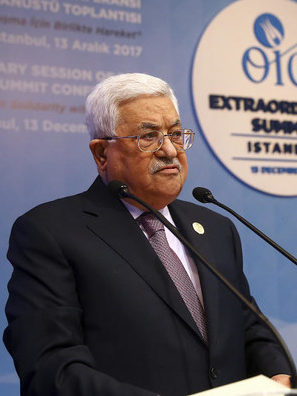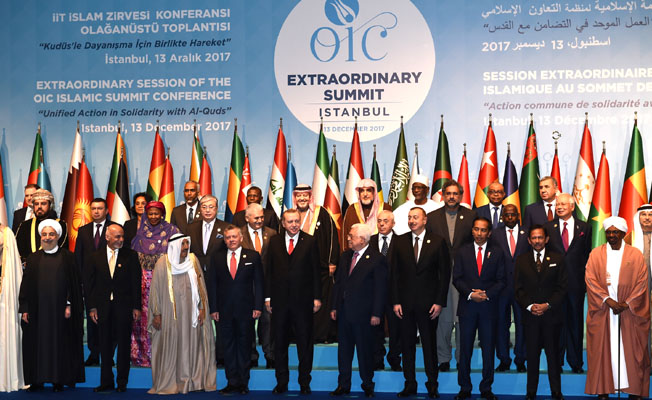Despite crude threats by the United States, the comity of nations expressed over-whelming global sentiment in favour of the Palestinian people through 129-8 UN General Assembly resolution. The Middle East is entering the culminating phase of post-Cold War American vision about this region Israel pliant Middle East. Trump’s announcement of recognizing Jerusalem as the capital of Israel was the topping on the cake. It prompted an outpouring of anger in the Muslim and Arab world. Collective and formalized response was channeled through the summit of the Organization of Islamic Cooperation (OIC). With the Islamic world itself mired in division, the summit fell well short of agreeing on any concrete sanctions against Israel or the United States. The status of Jerusalem, a city holy to Christians, Jews and Muslims, is perhaps the most sensitive issue in the Israeli-Palestinian conflict. Israel sees the entire city as its undivided capital, while the Palestinians want the eastern sector as the capital of their future state. And the Pope aired the Christian aspirations.
Successive US administrations have been striving to broker a peace deal in the Middle East since the Oslo accords. Trump, too, is working on it through his son-in-law Jared Kushner a Jew by faith, who has donated to the construction of illegal Israeli settlements in occupied Palestinian land. That speaks of the mindset and the likely trajectory.
The UN partition of 1947 had envisaged Jerusalem as a separate “international city.” During the 1967 war, Israel occupied East Jerusalem. Before 1980 a number of countries had their embassies in Jerusalem. But in July of that year, Israel passed a law that declared united Jerusalem as its capital. The UNSC had responded with a resolution condemning Israel’s annexation of East Jerusalem and declared it a violation of international law. By 2006, all countries had moved their embassies out of Jerusalem.
In 1995, the US Congress passed a law requiring America to move the embassy from Tel Aviv to Jerusalem. Since then every US President has declined to move the embassy, citing national security interests. Every six months, the President has used the presidential waiver to circumvent the embassy move. Trump has also signed such a waiver.

The OIC summit declaration states that the OIC member countries recognize Jerusalem as Palestine’s capital “under occupation”. The leaders “reject and condemn in the strongest terms the unilateral decision by the President of the United States recognizing al-Quds [Jerusalem] as the so-called capital of Israel, the occupying power; reject it as null and void legally, and consider it an attack on the historical, legal, natural and national rights of the Palestinian people, a deliberate undermining of all peace efforts, an impetus for extremism and terrorism, and a threat to international peace and security.” The OIC member states “declare East Jerusalem as the capital of the state of Palestine and invite all countries to recognize the state of Palestine and East Jerusalem as its occupied capital.” The statement added that the OIC “holds the US administration fully liable for all the consequences of not retracting from this illegal decision and regard it as an announcement of the US administration’s withdrawal from its role as a sponsor of peace and its realization among all stakeholders and an encouragement of Israel the occupying power, to continue its policy of colonialism, settlement, apartheid and ethnic cleansing.”
Reflecting the public sentiment of Pakistan, the National Assembly and Senate unanimously adopted strongly worded resolutions, condemning the American decision and demanding an immediate revisit to de-escalate the situation on the ground. Pakistan called upon the UN Security Council to take cognizance of this situation and take steps in accordance with the UN Charter. Pakistan has called upon the US to avoid the potentially grave repercussions in the region and beyond as this decision represents a serious violation of the international law and the relevant UN SC resolutions. “It is a serious setback to the rule of law and international norms. It signals a severe blow to the Middle East peace process as well.”
The OIC Summit was convened by Turkey’s President Recep Tayyip Erdogan, while addressing the participants he denounced Israel as a state defined by “occupation” and “terror”. “With this decision, Israel has been rewarded for all the terrorist activities it has carried out. It is Trump who bestowed this award,” he said. “The real proprietor of these lands is Palestine. “Mr. Trump wants all this to be Israel. This is the product of an evangelist and Zionist mentality”, he stated.
The President of Palestine Mahmoud Abbas warned that there could be no peace in the Middle East until the decision was reversed. He warned that the US had lost its role as mediator in the peace process and slammed the recognition of Jerusalem as the capital of Israel as a “gift” to the “Zionist movement” as if he “were giving away an American city.”

Addressing the summit, Prime Minister Shahid Khaqan Abbasi said a sovereign homeland for the Palestinian people with Al-Quds Al-Sharif as its capital remained the only road for the Ummah and the OIC. “We are at the watershed moment again. The question on every Muslim mind today would be whether we can rise above our differences, stand united and give hope to our people, or once again adopt declarations which cannot be translated into effective actions,” he told the conference.
Referring to Saudi Arabia, Iranian President Hassan Rouhani said, “Some countries in our region are in cooperation with the United States and the Zionist regime and determining the fate of Palestine.” Saudi King Salman, in Riyadh, echoed the calls over Jerusalem, saying it is the “right” of the Palestinians to establish “their independent state with East Jerusalem as its capital”. However, King Salman and Crown Prince Mohammed bin Salman have reportedly been in close contact with Trump over the Middle East, they were noticeably absent from the summit. Instead, Riyadh sent a senior foreign ministry official. Egypt, Saudi Arabia and the United Arab Emirates are unlikely to want to risk their key relationship with Washington by putting their name to anti-American measures, hence they would not go beyond lip-service.
Donald Trump has deconstructed the belief that campaign talk and post-campaign actions are two different things. Candidates running for president promise doing things undone by presidents before them, and undo the things done by predecessors. But once in the Oval Office, sobriety takes over the campaign hangover. Not with Trump, however.
Condemnation of Trump’s folly has come from a number of leaders and countries. The British PM called it “wrong”. “This is not the end of civilization as we know it, but the outcome is going to be suffering. A lot of suffering.” a statement issued by the PM office said. The Chinese Foreign Ministry spokesperson Geng Shuang said that the status of Jerusalem was a complicated and sensitive issue and China was concerned that the US decision “could sharpen regional conflict” Russia is of the view that the conflict between Israel and the Palestinian authorities could be aggravated further by Trump’s move. The UN envoy for the Middle East peace Nickolay Mladenov said: “The secretary general has spoken many times on this issue and he has said that we all have to be very careful with the actions we take because of the repercussions of these actions.” Pope Francis said “recognizing the rights of all people in the Holy Land is a primary condition for dialogue. “The Holy Land is for us Christians the land par excellence of dialogue between God and mankind,” he added.
Trump’s decision to recognize Jerusalem as the capital of Israel may prove to be the defining controversy of Trump’s first year in office. Israel shall continue to be between the devil and the deep sea, it never wants a one-state democracy as Arabs would outnumber Jews. The two-state solution has East Jerusalem as the capital of a future Palestinian state, endorsed by almost the entire world.




